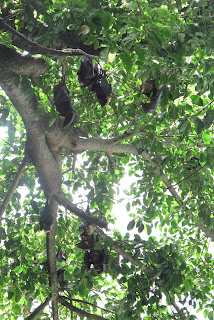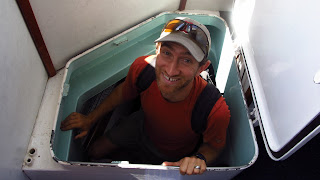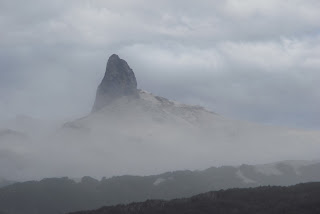


The days on the boat have been full of learning new things and and seeing the amazing GBR. We have seen white sided dolphins swimming along side us, schools of silver tipped reef sharks, Hawksbill and green sea turtles, manta rays, cow rays, travallies, tons of little fish, coral, invertebrates, schools of squid, a 4 foot long Napoleon wrasse and we even got to swim with a manta ray!


Woody and I have become pros at laying out and rolling up the transects tapes while diving to mark our research sites and Giovannina has been taking a million photos underwater and above.


In the evenings after dinner we all sit around and usually watch a movie or play Zilch - a new dice game they taught us. We also got a chance after diving the other day to go "Skurfing" (it's like water skiiing but with a surf board) it was the flattest day we had on the water and perfect for learning. Giovannina got up on her first try - all those years of skiing at Clear Lake paying off.

After 10 days at sea, we had to return to Cairns to resupply the boat with provisions and swap out one of our science crew. This gave us a chance to put our wobbly sea legs back on land and go out to dinner with the group. Using the excuse of land-sickness, Giovannina had already fallen off her chair before she drank two beers. It was at that point, as she stared up at the trees, that we knew it would be a fun evening.

Sitting at the marina bar as the sun set over the mountains, giant fruit bats swarmed overhead. We thought this was really something, but the Aussies just said, "Yeah, they do that every night." The next day we saw all the bats sleeping and making a racket in the trees right in downtown Cairns - they are huge.
After drinks, we attempted to find a restaurant recommended by Kate. Unfortunately, our group split up and the two of us and Alistair were left behind and had no idea where we were going. Wandering through Cairns Alistair called Kate, but accidentally got his friend Ed in Perth and took the opportunity to catch up with him as you do on a good drunk dial.

After a nice walk, Alistair got directions and we found the restaurant. It was a fabulous Balinese place - we were served our food on a miniature charcoal grill and the desserts were yummy! On the walk back to the boat, we found a tree full of roosting birds. We stood under the tree wondering what kind of birds they were. Kerryn, always the biologist, thought they were loroketes and to test her theory decided to throw her flip-flop into the tree. It seemed like a good idea at the time. The flip-flop went up but didn't come down. So under the urgings of the rest of us, she threw the other one to knock out the first one. Needless to say, Kerryn walked home shoeless. We later deduced that the birds must have been swallows - Australian tree shoe swallows.

The next day Bluey flew back to Townsville and Mike flew in to join us. We headed back out onto the reef for more diving.
Unfortunately, Woody's head cold lingered and his clogged sinuses meant he had to take a week off from diving. But Giovannina got to dive every day, which she loved and we all enjoyed the company and companionship of life on the M/V Floreat.










































